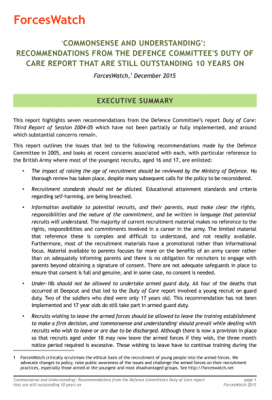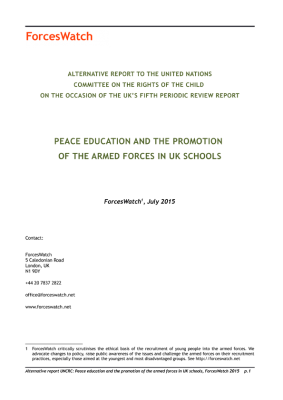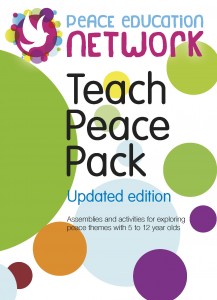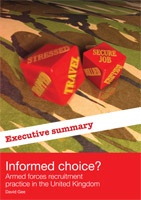human rights
‘Commonsense and Understanding’: Recommendations from the Defence Committee’s Duty of Care report that are still outstanding 10 years on
December 2015

This report highlights seven recommendations from the Defence Committee’s report Duty of Care: Third Report of Session 2004-05 which have not been partially or fully implemented, and around which substantial concerns remain.
This report then discusses the concept of 'in loco parentis' and 'moral obligation' with regard to the army's duty of care towards young recruits, noting that the Defence Committee were concerned in 2005 that the MoD distinguished too rigidly between legal and moral obligations, with the latter as less important.
In 2005, the Defence Committee discussed the lack of balance beween training needs and considerations for operational effectiveness, and thus made its recommendations. Ten years on, it is apparent that operational arguments, and current difficulties meeting recruiting targets, continue to prevent the armed forces from reviewing both their position on enlisting under-18s, and their recruitment practices and materials.
Peace education and the promotion of the armed forces in UK schools
November 2015

This report highlights that peace education is not being promoted in schools. This is counter to the recommendations made by the United Nations Committee on the Rights of the Child to the UK Government that peace education should be part of the curriculum. This raises concerns particularly with the increased promotion of the military within schools through the Department for Education's 'military ethos' programme and free military-related learning resources, and as the armed forces continue to conduct a substantial 'youth engagement' programme.
UK’s compliance with the UN Convention on the Rights of the Child: Report from the Joint Committee on Human Rights
March 2015
In advance of the United Nations Committee on the Rights of the Child's consideration of how the UK complies with the Convention on the Rights of the Child (during autumn 2015), the UK Parliament's Joint Committee on Human Rights has published a short report outlining areas of concern. The report states: Again, we hope that our successor committee will have an opportunity to scrutinise the issue of children serving in the armed forces in the light of the UN Committee's concluding ovservations which will be delivered in 2016.
International Standards on Conscientious Objection to Military Service
updated 2015
Published by the Quaker United Nations Office in November 2011, this booklet reflects recent changes in international law and practice that indicates that recognition of conscientious objection to military service as a human right is now stronger than ever.
Peace Education Network

The Peace Education Network is a national UK network that brings together people and organisations committed to education for peace.
Teach Peace pack
revised 2016

Teach Peace, a new resource from the Peace Education Network, is a set of eight assemblies, follow-up activities, resources, prayers and reflections on peace for primary schools. From the UN peace day, 21 September, to the International Day for Children as Victims of War, 4 June, the school year is ?lled with opportunities to use the assemblies and activities in Teach Peace. This resource will help to ensure peace is a key theme in our children’s education and help you to celebrate peace and the peacemakers in your school. The entire resource is free to download below. Hard copies of Teach Peace are available from the Peace Education Network for £5. Also available in Welsh.
AT EASE advice
AT EASE is an advice service to those in the armed forces and family members which has been running since the 1980s. It is staffed by volunteers. There is a telephone helpline or you can send an email. There is information on various terms of service issues and conscientious objection on the website.
Informed Choice? Armed forces recruitment practice in the United Kingdom
November 2007

An independent report by David Gee, published in 2007, highlighting the risks posed to young people through joining the military, how young people from disadvantaged communities are targeted, how information available to potential recruits is often misleading and how the terms of service are complicated, confusing and severely restricting. The research found that a large proportion join for negative reasons, including the lack of civilian career options.
UK Parliamentary Joint Committee on Human Rights report on Children’s Rights
November 2009
In their report on Children's Rights, the UK Parliamentary Joint Committee on Human Rights recommended that the 'UK adopt a plan of action for implementing the Optional Protocol, including these recommendations, fully in the UK, together with a clear timetable for doing so.' The UN Committee on the Rights of the Child recommendations under the Optional Protocol were that the UK 'reconsider its active policy of recruitment of children into the armed forces' and a number of other measures.
United Nations Convention on the Rights of the Child and the Optional Protocol on the Involvement of Children in Armed Conflict
October 2008
The UK remains the only EU country to recruit 16 year olds into the military and one of very few EU countries to recruit 17 year olds. The UK has signed the Optional Protocol to the Convention on the Rights of the Child on the Involvement of Children in Armed Conflict yet there is evidence that the UK continues to target children from vulnerable groups and that safeguards to protect under-18s are not effective.
